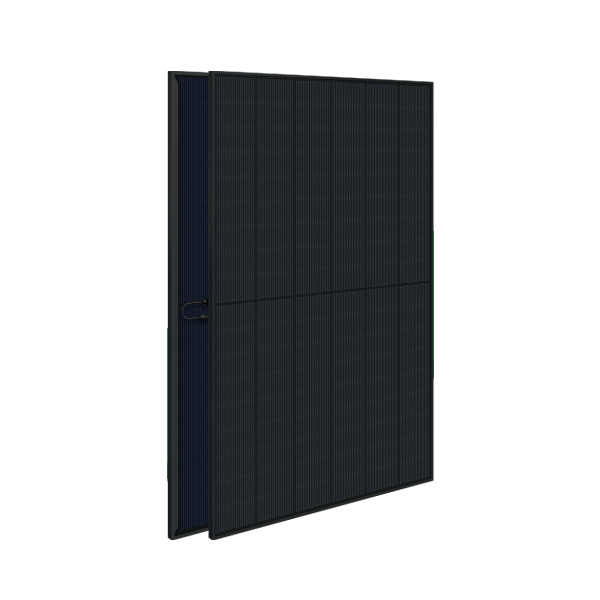Wholesale Solar Panels for Your House - ASTRO N7s CHSM54RNs(DG)(BLH)/F-BH Bifacial Series
- Poprzedni:
- Następny: Home Solar PV Module - China, Best Solar Panels for Home Use
Product Main Parameters
| Power Range | 440~460W |
|---|---|
| Power Sorting | 0~3% |
| Max Module Efficiency | 23.0% |
| First Year Power Degradation | ≤ 1.0% |
| Year 2-30 Power Degradation | ≤ 0.4% |
| Dimensions (L x W x H) | 1762 x 1134 x 30 mm |
| Cell Type | n-type mono-crystalline |
| No. of Cells | 108 (6*18) |
| Frame Technology | Aluminum, black anodized |
| Front/Back Glass | 1.61.6 mm |
| Cable Length | Portrait: ( )350 mm,( - )250 mm; Customized length |
| Cable Diameter (IEC/UL) | 4 mm²/ 12 AWG |
| Max Mechanical Test Load | 5400 Pa (front) / 2400 Pa (back) |
| Connector Type (IEC/UL) | HCB40 (Standard) / MC4-EVO2A (Optional) |
| Module Weight | 21.5 kg |
Common Product Specifications
| Rated Output (Pmpp/Wp) | 440, 445, 450, 455, 460 |
|---|---|
| Rated Voltage (Vmpp/V) | 33.05, 33.22, 33.39, 33.56, 33.73 |
| Rated Current (Impp/A) | 13.31, 13.40, 13.48, 13.56, 13.64 |
| Open Circuit Voltage (Voc/V) | 39.00, 39.20, 39.40, 39.60, 39.80 |
| Short Circuit Current (Isc/A) | 14.10, 14.19, 14.28, 14.36, 14.45 |
| Module Efficiency | 22.0%, 22.3%, 22.5%, 22.8%, 23.0% |
Product Manufacturing Process
Modern solar panel manufacturing involves several stages, starting with the purification of silicon. The purified silicon is then formed into ingots and sliced into thin wafers. These wafers are treated, doped, and layered to create solar cells. The cells are interconnected and assembled into solar panel modules, which are then framed, laminated, and fitted with glass and back sheets to ensure durability. The final products undergo rigorous testing for efficiency, durability, and safety standards before being packaged for distribution. The process ensures high-quality, reliable solar panels for your house.
Product Application Scenarios
Solar panels can be installed in various residential scenarios. Rooftop installations are the most common, offering efficient use of space and direct exposure to sunlight. Balcony installations are also feasible for apartments or buildings with limited roof space. Ground-mounted systems are another option, suitable for properties with ample land but less ideal roof conditions. These scenarios highlight the versatility and adaptability of solar panels for different residential needs, promoting energy independence and environmental sustainability.
Product After-Sales Service
We provide comprehensive after-sales service including technical support, maintenance, and warranty claims. Our team is available to assist with any issues to ensure your solar panels for your house operate efficiently.
Product Transportation
We offer reliable and secure transportation options, ensuring your wholesale solar panels for your house arrive safely. Packaging is optimized for protection during transit, minimizing the risk of damage.
Product Advantages
- High Efficiency: n-type TOPCon 4.0 technology offers up to 23.0% efficiency.
- Durability: Built to withstand harsh weather conditions with a robust aluminum frame and double glass.
- Aesthetic Appeal: All-black design blends seamlessly with modern rooftops.
- Cost Savings: Potential for significant utility bill reduction.
- Environmental Impact: Clean, renewable energy source reduces carbon footprint.
Product FAQ
- 1. What is the lifespan of solar panels?
Most solar panels have a lifespan of 25-30 years, with performance guarantees ensuring minimal degradation over time.
- 2. How much maintenance is required?
Solar panels are low-maintenance, requiring periodic cleaning and inspections to ensure optimal performance.
- 3. Can solar panels work in cloudy weather?
Yes, modern solar panels are designed to generate electricity even in cloudy conditions, though at reduced efficiency compared to sunny days.
- 4. What are the financial incentives for installing solar panels?
Various federal, state, and local incentives, including tax credits and rebates, are available to reduce the upfront cost of solar panels.
- 5. How do I determine if my roof is suitable for solar panels?
A professional assessment can determine if your roof receives sufficient sunlight and has the structural integrity to support solar panels.
- 6. Can solar panels increase my property value?
Yes, homes with solar panels often see an increase in property value due to the long-term cost savings and energy independence they provide.
- 7. What is the installation process like?
The installation process typically involves an initial assessment, design, permitting, and actual installation, which can take a few days depending on the system's complexity.
- 8. Can I go off-grid with solar panels?
While possible, going completely off-grid requires a robust solar panel system paired with significant battery storage capacity.
- 9. What happens to excess energy produced?
Excess energy can be stored in batteries or sent back to the grid, often earning credits or payments from your utility company.
- 10. Are there financing options available?
Yes, many financing options, including loans and leases, are available to make the transition to solar energy more affordable.
Product Hot Topics
- 1. The Future of Solar Panel Efficiency
The future of solar panel efficiency looks promising with ongoing advancements in materials and technology. Research into perovskite solar cells and other next-generation materials could significantly boost efficiency rates, making solar panels for your house even more viable and cost-effective. As technology continues to evolve, we can expect solar panels to become more efficient, affordable, and widely adopted, contributing to a greener and more sustainable future.
- 2. The Role of Solar Energy in Achieving Carbon Neutrality
Solar energy plays a crucial role in global efforts to achieve carbon neutrality. By significantly reducing reliance on fossil fuels, solar panels for your house contribute to lower greenhouse gas emissions and a smaller carbon footprint. Widespread adoption of solar energy can accelerate the transition to renewable energy sources, helping to mitigate climate change and protect the environment for future generations.
Image Description
There is no picture description for this product









